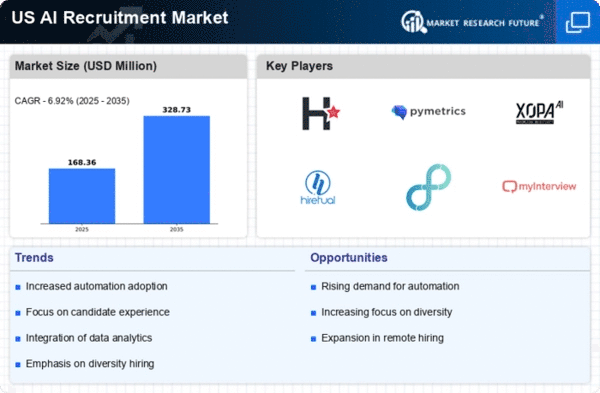Integration of Advanced Analytics
The integration of advanced analytics into the ai recruitment market is reshaping how organizations approach hiring. By leveraging data analytics, companies can gain insights into candidate behavior, preferences, and performance metrics. This data-driven approach allows for more informed decision-making, enhancing the effectiveness of recruitment strategies. In 2025, it is estimated that around 40% of organizations will utilize predictive analytics in their hiring processes. This trend indicates a shift towards a more strategic and analytical mindset in recruitment, where data informs every stage of the hiring process. Consequently, the ai recruitment market is evolving to provide tools that not only automate tasks but also offer deep analytical capabilities, enabling organizations to optimize their talent acquisition efforts.
Rise of Remote Work Opportunities
The rise of remote work opportunities is significantly impacting the ai recruitment market. As more companies adopt flexible work arrangements, the talent pool has expanded beyond geographical limitations. This shift necessitates the use of ai-driven recruitment tools that can effectively assess candidates regardless of their location. In 2025, it is anticipated that remote job postings will constitute over 50% of all job listings, highlighting the need for innovative recruitment solutions. The ai recruitment market is responding by offering platforms that facilitate remote hiring processes, enabling organizations to tap into a broader range of talent. This trend not only enhances recruitment efficiency but also aligns with the evolving expectations of the modern workforce.
Emphasis on Diversity and Inclusion
The ai recruitment market is increasingly influenced by the emphasis on diversity and inclusion within organizations. Companies are recognizing the importance of building diverse teams to foster innovation and improve business performance. In 2025, it is projected that organizations focusing on diversity in hiring will see a 30% increase in employee satisfaction and retention rates. This shift is prompting the development of ai tools that help eliminate bias in recruitment processes, ensuring a fair evaluation of candidates from various backgrounds. As organizations strive to create inclusive workplaces, the ai recruitment market is adapting to provide solutions that align with these values, thereby enhancing the overall effectiveness of talent acquisition.
Increased Investment in Recruitment Technology
The ai recruitment market is witnessing increased investment in recruitment technology as organizations seek to enhance their hiring capabilities. In 2025, it is projected that spending on recruitment technology will exceed $1.5 billion, driven by the need for more efficient and effective hiring solutions. Companies are prioritizing investments in ai tools that automate repetitive tasks, improve candidate engagement, and provide data-driven insights. This influx of capital is fostering innovation within the ai recruitment market, leading to the development of advanced solutions that cater to the evolving needs of employers and candidates alike. As organizations recognize the value of technology in recruitment, the market is poised for continued growth and transformation.
Growing Demand for Talent Acquisition Solutions
The AI Recruitment Market is experiencing a notable surge in demand for innovative talent acquisition solutions. Organizations are increasingly recognizing the need for efficient hiring processes to remain competitive. In 2025, the market is projected to reach approximately $2 billion, reflecting a growth rate of around 25% annually. This demand is driven by the necessity to streamline recruitment efforts, reduce time-to-hire, and enhance the quality of candidates. Companies are investing in ai-driven tools that facilitate better matching of candidates to job requirements, thereby improving overall hiring outcomes. As businesses strive to attract top talent, the ai recruitment market is positioned to play a pivotal role in transforming traditional hiring practices into more agile and effective strategies.
















